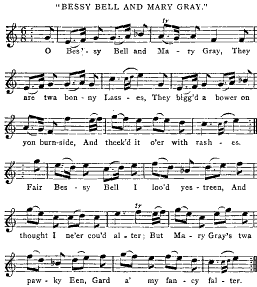English & Other 201. Bessy Bell and Mary Gray
CONTENTS:
[upcoming]
-----------------
The nursery rhymes of England, ed. by J.O. Halliwell edited by James Orchard Halliwell- Phillipps
XXXIX.
[The following stanzas are founded on the well-known Scotch talc]
Bessy Bell and Mary Gray,
They were two bonny lasses:
They built their house upon the lea,
And covered it with rashes.
Bessy kept the garden gate,
And Mary kept the pantry:
Bessy always had to wait,
While Mary lived in plenty.
---------------------
The Gresham Lectures
The Musical Times and Singing Class Circular, Vol. 33, No. 587 (Jan. 1, 1892), p. 48
. . .warded to me an old volume of songs belonging to him with a letter in which he pointed out the similarity of one of the
tunes in it to the air that I then quoted. The title of the book is "Thirty Scots Songs, adapted for a Voice and Harpsichord. The Words by Allan Ramsay. Book I.," and it was printed and sold by N. Stewart, Parliament Square, Edinburgh. The air in question is the third in this collection, and, omitting the opening and concluding symphonies, is as follows:-
"BESSY BELL AND MARY GRAY."

O Bessy Bell and Mary Gray,
They are twa bonny lasses,
They bigg'd a bower on yon burnside,
And theek'd it o'er with rashes.
Fair Bessy Bell I loo'd yestreen,
And thought I ne'er cou'd alter;
But Mary Gray's twa pawky Een,
Gard a' my fancy falter.
On comparing this air with the tune to the "Vicar of Bray" given last month, it is at once apparent that it is an exceedingly similar, though not quite identical, tune, and it seems a reasonable inference either that one is a -corrupted form of the other or that both are derived from some older air. One of the earliest of Ramsay's productions now known appeared in 17I2, when the poet was twenty-six years old, and after 1730 he may be said to have almost discontinued the profession of an author, though his death did not take place till 1757 or 1758. It is, therefore, eminently probable that " Bessy Bell" was printed in Edinburgh within a very few years of the composition of tthe words of the "Vicar of Bray." If it could be further shown that Colonel Fuller's troop of Dragoons, to which the author of the "Vicar" belonged, was a Scotch regiment, a fair presumption would be raised that the air quoted in your last month's issue was the original tune of the "Vicar of Bray."
I may add that Ramsay's " Bessy Bell " appears to have no connection with the song of the same title mentioned in Chappell's "Popular Music," and also that, by a curious blunder, which escaped more than one pair of eyes, September 4 was printed in my last letter, instead of September 2.
-Your obedient Servant,
JOHN H. MEE.
Kettel Hall, Oxford, December I7, I89I.
TO THE EDITOR OF "THE MUSICAL TIMES.
SIR, May I take the liberty to suggest that in the letter of Mr. John H. Mee, published on the first of this month (P. 745), there is an error of date in your correspondent's quotation in reference to the air of this old song? The last day of the old style was Wednesday, September 2 (not 4), and the next day, Thursday, was the I4th- the intermediate numbers, September 3 to September 13 inclusive, had no place in our calendar of 1752.
Your obedient Servant,
KANT O ' PHERMO.
Dublin, December 4, I89I.